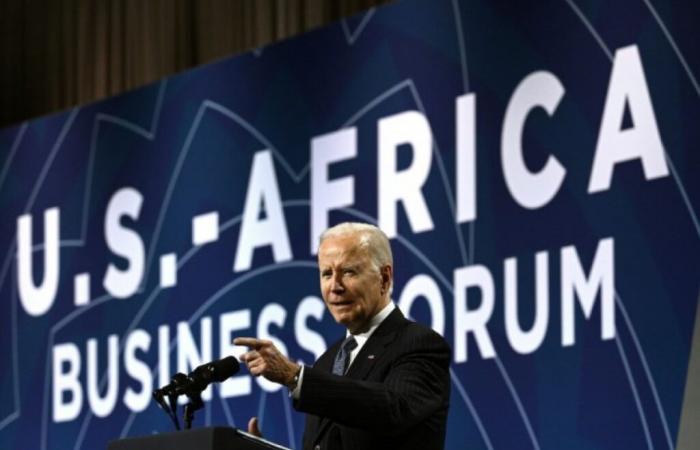Washington (©2024Afriquinfos) – Paradoxically to his predecessor Trump, the current American President Joe-Biden, during his one and only mandate, aspired to take another turn in United States policy in Africa. The one who will soon be the former tenant of the White House, has often called for “ partnership » with Africa, the key to “success” for the world.
One month after his arrival at the helm in January 2021, the 44th President of the United States, Joseph Biden sent a video message to African presidents on the eve of the 34th summit of the African Union (AU). For his first speech to an international body as president, Biden assured Africa that the United States is ‘‘a partner in solidarity, support and mutual respect’’.
Joe Biden also reconnected with the United States-Africa Summit (an initiative established by Barack Obama in 2014, but which was ultimately aborted by Trump). The event was held from December 13 to 15, 2022, in Washington, the American capital. The American president welcomed for the occasion the 49 member leaders of the African Union as part of the second United States-Africa summit. It is in a context of a struggle for influence between foreign powers on the continent with its many natural resources that this event had, for the Democratic President, an essential strategic character.
The summit of U.S. and African leaders focused on a long-term, comprehensive vision for a strong, strategic U.S.-Africa relationship to ensure the collective prosperity of the American and African people. Such a relationship should be based on absolute mutual respect and shared values.
$55 billion over three years
The Biden administration had for the occasion announced to release 55 billion dollars for Africa over three years in areas as varied as digital technology, infrastructure, health and even the fight against climate change.
During this meeting, the United States announced more than 15 billion dollars (14 billion euros), new trade and investment partnerships. Joe Biden himself closed the event with several announcements, including new government loans and grants for African projects and strengthened cooperation with the African Continental Free Trade Area (Zlecaf).
« We cannot solve the challenges before us without leadership from Africa. I’m not trying to be nice. It’s a fact“, Joe Biden said.
« This partnership is not intended to create political obligations, to create dependency, but to stimulate shared successes and create opportunity“, he clarified, emphasizing that “ Africa’s economic transition depended on good governance, healthy populations and affordable energy« .
In 2023, the United States welcomed the African Union as a permanent member of the G20, expanded trade and investment partnerships, fostered significant investments in food and health security, launched a transformation initiative digital, forged new cooperation in security and good governance and catalyzed historic engagement on the part of the diaspora.
A plea for the renewal of AGOA
At the African Growth and Opportunity Act (AGOA) Forum in Washington July 23-24, President Joe Biden urged Congress to reauthorize and modernize the legislation before it expires in 2025. For more than twenty years ago, AGOA, the result of a bipartisan consensus, constitutes the basis of economic relations between the United States and African countries.
AGOA has largely contributed to increasing the competitiveness of African products in sub-Saharan Africa, creating tens of thousands of quality jobs and promoting human rights. In the United States, it has opened up new investment and market opportunities for American companies. On both sides of the Atlantic, this law has enabled sustainable economic growth and the establishment of resilient supply chains.
‘’As I said before, America is totally focused on Africa. This week, and in the weeks to come, let’s prove it,” declared Joe Biden on the sidelines of said forum. “Together, let’s ensure that future generations of Americans and Africans can meet the challenges and seize the opportunities of the decades to come”, he argued.
A trip to the continent
A few weeks before the end of his mandate, American President Joe Biden has chosen to visit Africa. This will be his first trip to the continent since taking office in January 2021. The first week of December, President Biden will travel to Luanda, Angola, where he will celebrate the transformation of relations between the United States and Angola, will recognize Angola’s role as a strategic partner and regional leader and will discuss increased collaboration on security, health and economic partnerships, including support of the G7 Investment Partnership in global infrastructure in favor of the Lobito Corridor, which will benefit both peoples.
In addition, the United States has committed to financing up to $555 million for the “Lobito corridor”, 1,300 kilometers long. This is a railway intended to connect Zambia and the DRC to the Angolan port of Lobito.
Launched in September 2023 under the aegis of the United States and its European allies, the Lobito rail corridor aims to connect the rich mines of northern Zambia and southern DRC to the Angolan port of Lobito, on the Atlantic coast . After months of negotiations with these three countries, the United States is now turning its attention to East Africa in hopes of extending the line.
This trip will mark Joe Biden’s first visit to sub-Saharan Africa since his election as president in 2020, the first visit by a United States president to Angola and the first presidential visit to Africa by an American leader, since that of Barack Obama in 2015.
It is part of the administration’s efforts to strengthen ties with the continent, particularly to counter the growing influence of China.
Barely had he finished his first term at the White House when Joe Biden announced he was withdrawing his candidacy a few months before the United States presidential election which is being held on November 5, 2024.
Vignikpo Akpené






